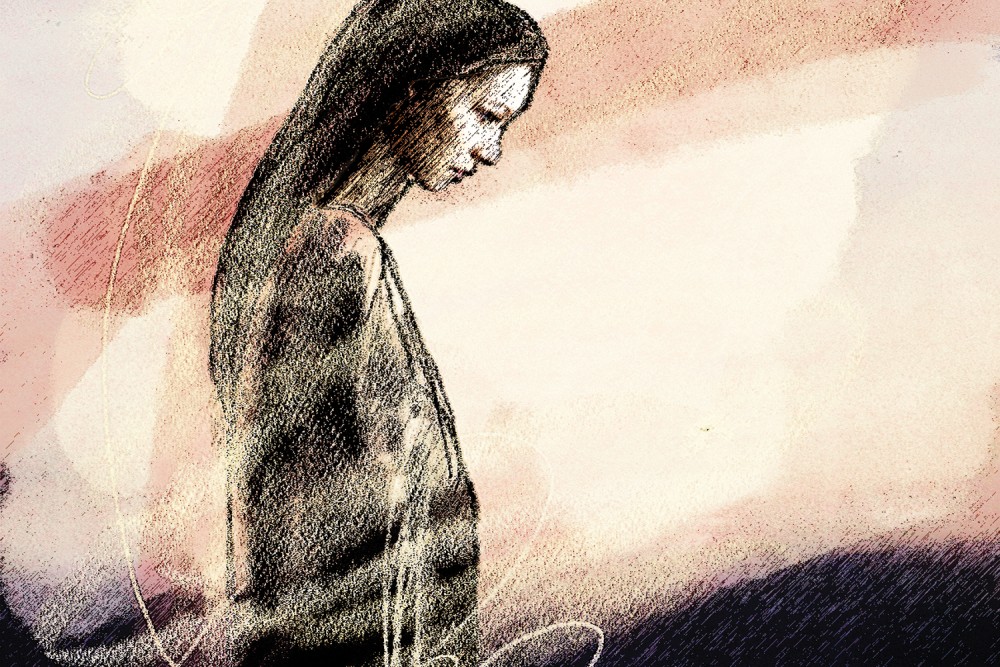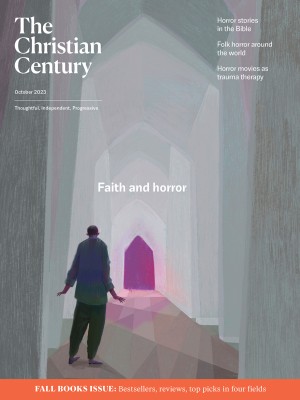Can dead things live again?
When the widow in Luke 7 sees her son revived, she isn’t thinking about biology.

(Century illustration)
One of the consequences of living in a world with more knowledge of nature and a more expansive understanding of history is a certain kind of death: of the mystical, the idea of blessings, of God’s seeming intervention in every good thing that happens. To say nothing of miracles—real, turn-nature-on-its-head kind of miracles. We live in a world that sometimes feels thoroughly demystified.
It’s not that I don’t believe in the miraculous or the possibility that God moves in our midst. But it’s difficult to ignore the possibility that seemingly miraculous healings may have been profound misunderstandings about how our bodies and world worked. So it’s easier to speak of God working through our knowledge or skill. Maybe less exciting, but still a way of seeing how God is working among us.
Read our latest issue or browse back issues.
Sometimes, of course, people really do believe in miracles and blessing. Whatever is good in our lives comes from God. A check in the mail. Blessed! The car that swerved and just missed us. Blessed! I was born into a family without want. Blessed! Depending on our tradition, we may say this out loud or keep it to ourselves. But sometimes it’s hard for us to say the word blessed. We know someone who got a collection notice instead of a check, who did get hit by a car and is still struggling with the injuries, who worked hard every day of their life but whose paycheck always weighed less than the stack of bills on the table.
The question of how God moves in the little things is a knot sometimes. Maybe a demystified world, in which our decisions and our deeds are the means, feels a little safer than questions of why.
But it also feels like its own kind of bondage, that somehow everything in our world—God’s very acts and movements, our collective journey toward shalom—is our work. This doesn’t feel right either, especially when we see God moving all the time in scripture. “Can dead things live again?” seems to be the entire point of Christian life. Death is never the end of the story.
When I return to the miracles of Jesus, especially when he raises the dead, I realize that I so often focus on the biology of it. The wonder is in the awe-inspiring and slightly horrific reversal of death. But when I read again, maybe the miracles are pointing to something else.
In Luke 7 Jesus comes upon a funeral procession in Nain. Among the mourners walks the dead man’s mother, a widow.
All she can think about are the moments she had with him, maybe the way he laughed or the way he ate figs or the sound of his voice when he was excited. But mingled with what was are laments over what will never be: no watching him fall in love, no grandchildren. Being without a husband or son may also put her in financial peril. She is on a precipice, a meeting place of safety and wilderness, a borderland of what was and what will be.
“Arise,” says Jesus, and the dead man sits up and begins to speak. And Jesus gives the man back to his mother, the text says.
The crowd is afraid and amazed; they glorify God and talk about a great prophet. But while everyone is gawking at Jesus, the widow is undoubtedly holding her son, his face in her hands, crying in awe, overwhelmed.
She isn’t thinking about the biology. She is thinking about the relationship, about the future she has been given. Those in the crowd see something to talk about at dinner, the subject of stories for years to come. Maybe some of them will remember Jesus or even become his follower, but maybe that isn’t the point.
Every time the widow sees her son return home from work, every time he smiles or wanders off in thought, she will recall what could have been. What Jesus gives her isn’t about the biology, about the natural or unnatural. Jesus gives her a new possibility. And if the people in the crowd had eyes to see, they would be talking about the dead future Jesus makes living again, not just the dead person brought to life.
When we begin to see the possibility of new futures, of new relationship and restoration, we can begin to see the possibility of what Jesus says to his disciples: that they too will perform miracles. Yes, some will heal the sick and even bring the dead to life, but under every one of those moments there is a person wondering what will come next for them. There are loved ones struggling to make ends meet and trying the best they can to figure out how to be there for the people they love.
In a time when we feel the sharp edges of a world that seems ever more complex and overwhelming, perhaps we need more of the mystical, of the sense that there is always more than what we sense and that God is moving in it. We could even ask whether God might meet us at our city gate, have compassion on us, walk up to the dead things we are following behind, whisper something to them, and give them back to us.
When I look up from those pages through the wet eyes of the widow, I can begin to see a bit more of the movement of God in my life, the ways God has raised things in my life I thought long dead. Sometimes they were dramatic, but more often there were many small miracles that made life possible. Maybe we can say that we are blessed, that God is moving and moves in us. Maybe, more than anything, we need to let God speak to the hope that so often lies on the biers of our life.






